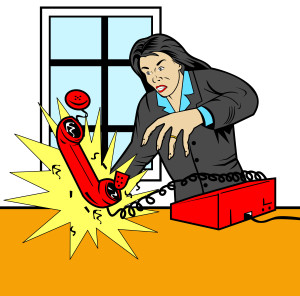No ma’am, you cannot speak to my supervisor. No ma’am, I don’t even have the number for a supervisor. No ma’am, there is nothing you can do to improve this situation. I have total power over you via this phone line, and I am not relinquishing it.
Have you ever been given the runaround by a customer service rep? The above is the experience of what my friend Shellie encountered with an insurance company “Customer  Service Rep” rep.
Service Rep” rep.
Shellie was in a fender-bender that wasn’t her fault. The other driver’s insurance was paying for a rental car while hers was being repaired.
It seemed like a minor inconvenience, until she went to pick up her rental and was given a dinky economy car with a smaller than small back seat, that wouldn’t accommodate her clients, whom she drove around on a daily basis.
She called the other driver’s insurance company to request a bigger car and that’s where she encountered the Ms. Customer Service Blocker, who was masquerading that day as a Customer Service Rep.
Ms. Blocker proclaimed, “Our policy is for an economy car.” Followed by an “hrummp” as if she delighted in letting Shellie know who was really in charge.
Shellie politely asked to speak with a supervisor, whereupon Ms. Blocker went into full throttle defense mode. Not only was she not going to connect Shellie to a supervisor, but she claimed to not even know their name or number.
A few Google searches later, Shellie was speaking with the regional supervisor, who granted her request and profusely apologized saying, “That’s not how our people are supposed to  speak to customers.”
speak to customers.”
Who’s at fault? Ms. Blocker? Perhaps. But it’s more likely that her behavior is a direct result of the culture and policies of her organization.
Here are three things companies due that cause terrible customer service:
1. Profit-based reward systems
Rewarding employees on profitability sounds good in theory, but it’s a shortsighted metric that has a chilling effect on service. Executives should be rewarded on profit; service reps should be rewarded on customer satisfaction. Customer service is an investment in long-term reputation. Rewarding service people for short-term profits results in them trying to get off the phone faster and holding back anything that might add cost, like a rental upgraded. They are incented to beat the customer rather than serve the customer.
2. Fear of lower-level decision making
One reason so many organizations have restrictive policies is that they’re deathly afraid that their people will give away the store. The best organizations (think Apple & Nordstrom) empower their people. They’re not afraid because they’ve trained their people to actually think. Their service reps know when to provide something and when customers are trying to take advantage.
3. Fear-based culture
Ms. Blocker may have been a manipulative psychopath who took delight in seeing people suffer. It’s more likely that she was just trying to avoid getting into trouble. It doesn’t matter what the official policy is, if supervisors get angry whenever reps hand off calls to them, the service reps learn very quickly, keep customers away from the boss. Unofficial company culture always trumps policy when it comes to service behavior.
It’s nice to say customers are the number one priority. But when you create reward system, decision-making policies, and culture that promote the opposite, your employees act accordingly.
And it’s only a matter of time before your customers go somewhere else.